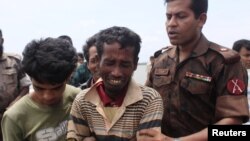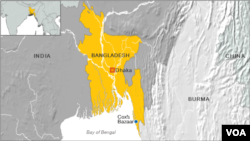Human Rights Watch says Bangladesh's restriction on international aid groups is contributing to a worsening humanitarian emergency for ethnic Rohingya Muslims fleeing sectarian violence in Burma.
Bangladesh last month ordered three charity groups to stop providing assistance to Rohingya because it said they were encouraging more refugees to cross the border.
Doctors Without Borders, Action Against Hunger, and Muslim Aid were providing water, healthcare, sanitation, and other basic assistance to Rohingya refugees in Bangladesh's Cox's Bazaar district.
In a statement Thursday, Human Rights Watch accused Bangladesh of trying to make conditions for its estimated 200,000 Rohingya refugees "so awful that people fleeing human rights abuses in neighboring Burma will stay home."
The group said Rohingya taking refuge in Bangladesh are subject to "squalid and overcrowded" conditions in both official and makeshift refugee camps. It said the camps are running short on food and clean water and conditions "are among the worst in the world."
Bangladesh has officially denied forcing Rohingya to return to Burma. But senior Bangladeshi border guards reportedly told Human Rights Watch they have pushed back as many as 1,300 Rohingya trying to flee Burma since mid-June.
Bangladesh's Foreign Ministry was not available to comment on the matter.
Rohingya are fleeing violence that broke out in Burma in late May, when long-simmering sectarian tensions erupted into violence after three Muslims were accused of raping and murdering a young Buddhist woman.
Rights groups such as Human Rights Watch and Amnesty International say Burmese security forces carried out a campaign of violence and mass arrests against the Rohingya in the aftermath of the unrest.
Burma's government, which has a long history of violence against ethnic minorities, has denied the accusations, saying its security forces acted with restraint in dealing with the Rohingya.
Burmese President Thein Sein said earlier this month in an interview with VOA that his government plans to open schools to improve the education of the minority group, saying education plays an important part in helping different communities co-exist.
The Burmese government refuses to recognize the country's estimated 800,000 Rohingya Muslims as an ethnic group and denies them citizenship. Many Burmese consider the Rohingya to be illegal immigrants from Bangladesh.
Bangladesh last month ordered three charity groups to stop providing assistance to Rohingya because it said they were encouraging more refugees to cross the border.
Doctors Without Borders, Action Against Hunger, and Muslim Aid were providing water, healthcare, sanitation, and other basic assistance to Rohingya refugees in Bangladesh's Cox's Bazaar district.
In a statement Thursday, Human Rights Watch accused Bangladesh of trying to make conditions for its estimated 200,000 Rohingya refugees "so awful that people fleeing human rights abuses in neighboring Burma will stay home."
The group said Rohingya taking refuge in Bangladesh are subject to "squalid and overcrowded" conditions in both official and makeshift refugee camps. It said the camps are running short on food and clean water and conditions "are among the worst in the world."
Bangladesh has officially denied forcing Rohingya to return to Burma. But senior Bangladeshi border guards reportedly told Human Rights Watch they have pushed back as many as 1,300 Rohingya trying to flee Burma since mid-June.
Bangladesh's Foreign Ministry was not available to comment on the matter.
Rohingya are fleeing violence that broke out in Burma in late May, when long-simmering sectarian tensions erupted into violence after three Muslims were accused of raping and murdering a young Buddhist woman.
Rights groups such as Human Rights Watch and Amnesty International say Burmese security forces carried out a campaign of violence and mass arrests against the Rohingya in the aftermath of the unrest.
Burma's government, which has a long history of violence against ethnic minorities, has denied the accusations, saying its security forces acted with restraint in dealing with the Rohingya.
Burmese President Thein Sein said earlier this month in an interview with VOA that his government plans to open schools to improve the education of the minority group, saying education plays an important part in helping different communities co-exist.
The Burmese government refuses to recognize the country's estimated 800,000 Rohingya Muslims as an ethnic group and denies them citizenship. Many Burmese consider the Rohingya to be illegal immigrants from Bangladesh.






